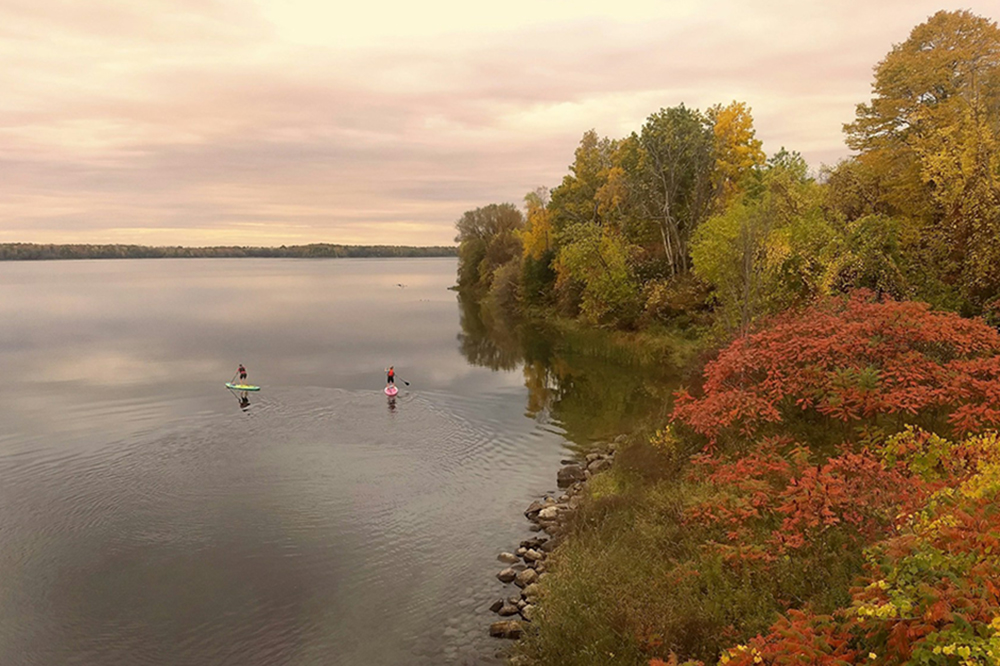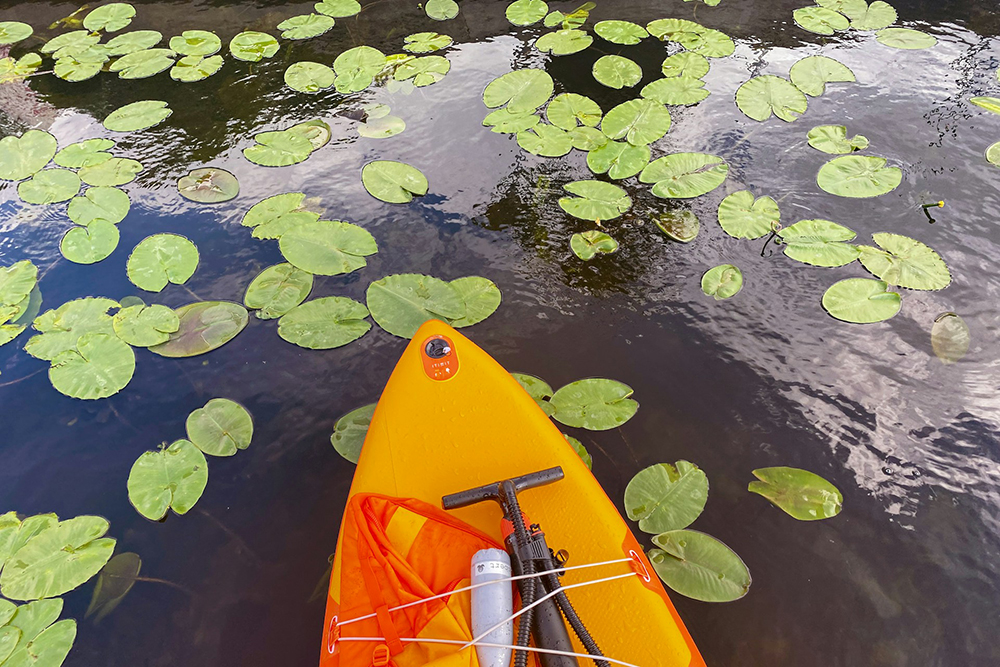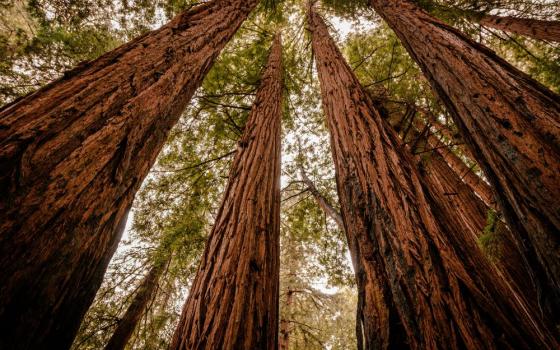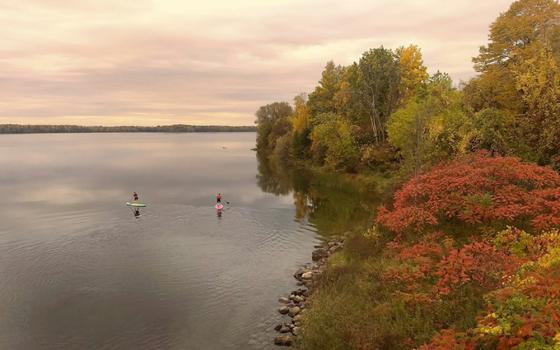
(Unsplash/Alex Guillaume)
"Stop chasing me," is what I imagined the great blue heron telling me. As I paddled along the reservoir's shore, she would fly some feet away as I approached, only for me to again appear on my paddleboard a few minutes later. I tried to convey to her that I was searching for the same thing as her, solitude, and did not mean to disturb her. But eventually she flew across the reservoir, surely exasperated.
I was at Monksville Reservoir in New Jersey as part of our individual retreat day at the Laudato Si' Movement. Each month, we attempt to step outside of our usual busy rhythms or work for reflection and prayer as part of our commitment to living contemplation and action. This day, I was in search of a wild place — or at least a wilder place than my usual environs of asphalt and other signs of humanity.
I eventually found a quiet cove where other boaters were minimal. I lay my paddle down and sat cross-legged on my board. A caterpillar floated downward from a nearby tree branch. A cloud of translucent gnats hovered in the sun. Small fish zipped beneath the water's surface. And a turtle, shy, dunked its head after seeing me above the surface.
Advertisement
As I rested in silence and stillness, God's love was palpable through this embrace of nature's beauty. I could feel my body relaxing, as I felt myself becoming a part of the natural surroundings instead of being a mere observer, or even consumer, of the beauty. I, too, was a creature, somehow fitting into this interconnected web of life.
Pope Francis says in his encyclical Laudato Si', "An integral ecology includes taking time to recover a serene harmony with creation … contemplating the Creator who lives among us and surrounds us, whose presence 'must not be contrived but found, uncovered.' "
This invitation to recover a sense of harmony with creation seems simple — especially when immersed in nature — but not easy. For as Francis also says, "Nature is filled with words of love, but how can we listen to them amid constant noise, interminable and nerve-wracking distractions, or the cult of appearances?"
The first step in contemplation is to pause. Again simple, but not easy. By pausing, we make space to connect with our intention, our heart's desire, or better yet God's desire for us, in the moment. It does not necessarily mean physically stopping, but simply making space to connect with what matters. It is a shift, however briefly, to a stance of receptivity.
This invitation to recover a sense of harmony with creation seems simple — especially when immersed in nature — but not easy.
Pausing might be the hardest part of contemplation because it requires us to be willing to step outside of our usual way of operating. We are often caught in an auto-pilot mode focused on accomplishing things. To pause, even for a moment, can seem unnecessary and inefficient.
When I first put my paddle board in the water, I paddled rapidly, driven by a desire to travel to the far end of the reservoir, to accomplish something. Through the grace of God, I paused for a moment, and asked myself, "Why am I here?" My heart quickly answered, "To be present, to listen, to pray." I then realized that I did not have any particular place to go or goal to achieve. It was then I found my cove and took a longer pause of contemplation.
Francis warns that the danger of not pausing can be to get caught in a technocratic paradigm that focuses on us as human "doers" and not human "beings." "We are called to include in our work a dimension of receptivity and gratuity, which is quite different from mere inactivity," he says. "Rather, it is another way of working, which forms part of our very essence. It protects human action from becoming empty activism."
Pausing is not easy, because we often do not think we have time. And yet, pausing can be a second to shift our gaze to God. The key of the pause is not that we are physically stopping, but that we are connecting with our desire to relate differently to what is happening in the moment, from a posture of receiving.

(Unsplash/Robert Katzki)
This shift can take a matter of milliseconds as you open to what is present in your experience here and now. Bringing attention to the senses — what one is seeing, hearing, feeling, smelling — can help to bring one into the present moment. Asking an open ended question, such as, "What is important right now?" or, "Where is God?" can also be helpful.
To pause can be a radical act because it says that, yes, I will disrupt my normal way of doing, which focuses on productivity, efficiency and utility, into a way of listening, receiving and being. It shifts the focus from me at the center to God or the other at the center — whether other people or other living beings.
"Without contemplation, it is easy to fall prey to an unbalanced and arrogant anthropocentrism, the 'I' at the centre of everything, which overinflates our role as human beings, positioning us as absolute rulers of all other creatures," Francis said during a general audience.
For we are not the rulers, we are creatures — creatures beloved by our Creator who has filled nature with "words of love." The gift of contemplation is to help us to hear those words of love, not just in nature, but within ourselves, too. We, too, are part of creation.
The gift of contemplation is to help us to hear those words of love, not just in nature, but within ourselves, too. We, too, are part of creation.
As I sat floating on top of the quiet surface of the water, I recalled a phrase the Trappist monk and writer Thomas Merton used: "le point vierge," or loosely translated, "the virgin point."
"At the center of our being is a point of nothingness which is untouched by sin and by illusion, a point of pure truth, a point or spark which belongs entirely to God, which is never at our disposal, from which God disposes of our lives," wrote Merton. "This little point of nothingness and of absolute poverty is the pure glory of God in us."
While the reservoir was not exactly a virgin point, given it was human made to address water shortages in northern New Jersey, in its wildness it somehow mirrored the virgin point within me where the "pure glory of God" resides. I could sense, however fleetingly, myself as a "word of love."
What if we walked around ever-mindful of this truth? Imagine how the world, how we, might be.








